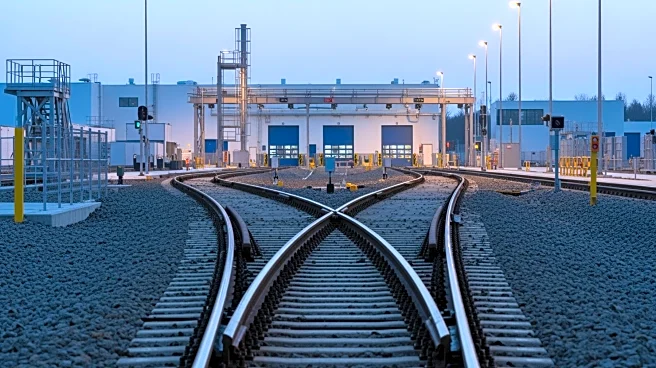What's Happening?
Tenaris has announced the construction of a new 2.3-mile rail spur at its Midland service center in Texas, connecting directly to the Union Pacific railway. This $12.5 million investment aims to improve
efficiency by allowing nearly one-third of the yard's volume to be received by rail, reducing costs and minimizing road traffic. The construction is set to begin in early 2026 and is expected to be completed within the same year. The Midland service center, which has seen significant investment since 2016, serves as Tenaris's largest pipe yard worldwide and plays a crucial role in the company's Rig Direct® mill-to-well service model.
Why It's Important?
The expansion of Tenaris's operations in the Permian Basin is crucial for enhancing logistical efficiency and reducing environmental impact. By increasing rail connectivity, Tenaris aims to lower transportation costs and decrease carbon emissions associated with truck deliveries. This development supports the company's commitment to safety and customer service, benefiting both clients and the local community. The investment reflects the growing importance of the Permian Basin as a key area for oil and gas production, and Tenaris's strategic focus on supporting drilling projects through integrated service frameworks.
What's Next?
Construction of the rail spur is scheduled to start in early 2026, with completion expected later that year. Once operational, the rail spur will facilitate more efficient delivery of pipes and materials, potentially leading to further expansions and investments in the Midland service center. Tenaris's continued investment in infrastructure may attract more oil and gas operators to the region, enhancing collaboration and service offerings. The company will likely continue to explore opportunities for further expansion and technological advancements to maintain its competitive edge in the industry.
Beyond the Headlines
The development of the rail spur at Tenaris's Midland service center highlights broader trends in the oil and gas industry, including the emphasis on sustainability and operational efficiency. As companies seek to reduce their environmental footprint, investments in infrastructure that minimize emissions and enhance safety are becoming increasingly important. This project also underscores the role of logistics in the energy sector, where efficient transportation and supply chain management are critical for maintaining competitiveness. The expansion may influence other industry players to adopt similar strategies, contributing to a more sustainable and efficient energy landscape.












